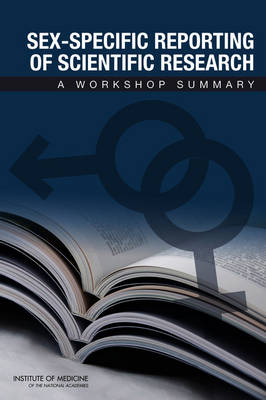
Sex-Specific Reporting of Scientific Research
A Workshop Summary
Seiten
2012
National Academies Press (Verlag)
978-0-309-22524-3 (ISBN)
National Academies Press (Verlag)
978-0-309-22524-3 (ISBN)
- Titel z.Zt. nicht lieferbar
- Versandkostenfrei innerhalb Deutschlands
- Auch auf Rechnung
- Verfügbarkeit in der Filiale vor Ort prüfen
- Artikel merken
The number of women participating in clinical trials has increased during the last two decades, but women are still underrepresented in clinical trials in general. Some of the overall increase can be attributed to the greater number of women-only trials (of therapies for diseases that affect only women). Even when women are included in clinical trials, the results are often not analyzed separately by sex.
On August 30, 2011, the Institute of Medicine (IOM) Board on Population Health and Public Health Practice hosted the workshop Sex-Specific Reporting of Scientific Research. The workshop explored the need for sex-specific reporting of scientific results; potential barriers and unintended consequences of sex-specific reporting of scientific results; experiences of journals that have implemented sex-specific requirements, including the challenges and benefits of such editorial policies; and steps to facilitate the reporting of sex-specific results. Presenters and participants included current and former editors of scientific journals, researchers, and scientists and policymakers from government, industry, and nonprofit organizations. Presentations and discussions highlighted the importance to both women and men of having sex-specific data, the problems with sample size and financial constraints for conducting the research, the appropriateness of sex-specific analyses, and the limitations of journal policies to change experimental designs.
Sex-Specific Reporting of Scientific Research summarizes the presentations and discussions by the expert panelists during the IOM workshop. The workshop's first session focused on why sex-specific reporting is important. Panelists highlighted historical and current events that have hindered or helped to advance the study of women. In the next session, panelists in academe discussed the challenges of collecting, analyzing, and reporting sex-specific data from the researcher's perspective. That was followed by two panels of leading journal editors who shared their experiences in developing and implementing editorial policies and the implications of sex-specific reporting policies for journals.
Table of Contents
Front Matter
OVERVIEW
INTRODUCTION
INCLUSION OF WOMEN IN CLINICAL TRIALS FUNDED BY THE NATIONAL INSTITUTES OF HEALTH
WHY SEX-SPECIFIC REPORTING IS IMPORTANT
THE RESEARCHER PERSPECTIVE: COLLECTING, ANALYZING, AND REPORTING SEX-SPECIFIC DATA
THE EDITOR PERSPECTIVE: IMPLEMENTING JOURNAL EDITORIAL POLICIES
IMPLICATIONS FOR JOURNALS OF SEX-SPECIFIC REPORTING POLICIES OF JOURNALS
LOOKING FORWARD
CLOSING REMARKS
REFERENCES
Appendix A: Workshop Agenda
Appendix B: Speaker Biosketches
Appendix C: Planning Committee Biosketches
On August 30, 2011, the Institute of Medicine (IOM) Board on Population Health and Public Health Practice hosted the workshop Sex-Specific Reporting of Scientific Research. The workshop explored the need for sex-specific reporting of scientific results; potential barriers and unintended consequences of sex-specific reporting of scientific results; experiences of journals that have implemented sex-specific requirements, including the challenges and benefits of such editorial policies; and steps to facilitate the reporting of sex-specific results. Presenters and participants included current and former editors of scientific journals, researchers, and scientists and policymakers from government, industry, and nonprofit organizations. Presentations and discussions highlighted the importance to both women and men of having sex-specific data, the problems with sample size and financial constraints for conducting the research, the appropriateness of sex-specific analyses, and the limitations of journal policies to change experimental designs.
Sex-Specific Reporting of Scientific Research summarizes the presentations and discussions by the expert panelists during the IOM workshop. The workshop's first session focused on why sex-specific reporting is important. Panelists highlighted historical and current events that have hindered or helped to advance the study of women. In the next session, panelists in academe discussed the challenges of collecting, analyzing, and reporting sex-specific data from the researcher's perspective. That was followed by two panels of leading journal editors who shared their experiences in developing and implementing editorial policies and the implications of sex-specific reporting policies for journals.
Table of Contents
Front Matter
OVERVIEW
INTRODUCTION
INCLUSION OF WOMEN IN CLINICAL TRIALS FUNDED BY THE NATIONAL INSTITUTES OF HEALTH
WHY SEX-SPECIFIC REPORTING IS IMPORTANT
THE RESEARCHER PERSPECTIVE: COLLECTING, ANALYZING, AND REPORTING SEX-SPECIFIC DATA
THE EDITOR PERSPECTIVE: IMPLEMENTING JOURNAL EDITORIAL POLICIES
IMPLICATIONS FOR JOURNALS OF SEX-SPECIFIC REPORTING POLICIES OF JOURNALS
LOOKING FORWARD
CLOSING REMARKS
REFERENCES
Appendix A: Workshop Agenda
Appendix B: Speaker Biosketches
Appendix C: Planning Committee Biosketches
1 Front Matter; 2 OVERVIEW; 3 INTRODUCTION; 4 INCLUSION OF WOMEN IN CLINICAL TRIALS FUNDED BY THE NATIONAL INSTITUTES OF HEALTH; 5 WHY SEX-SPECIFIC REPORTING IS IMPORTANT; 6 THE RESEARCHER PERSPECTIVE: COLLECTING, ANALYZING, AND REPORTING SEX-SPECIFIC DATA; 7 THE EDITOR PERSPECTIVE: IMPLEMENTING JOURNAL EDITORIAL POLICIES; 8 IMPLICATIONS FOR JOURNALS OF SEX-SPECIFIC REPORTING POLICIES OF JOURNALS; 9 LOOKING FORWARD; 10 CLOSING REMARKS; 11 REFERENCES; 12 Appendix A: Workshop Agenda; 13 Appendix B: Speaker Biosketches; 14 Appendix C: Planning Committee Biosketches
| Erscheint lt. Verlag | 13.2.2012 |
|---|---|
| Verlagsort | Washington |
| Sprache | englisch |
| Maße | 152 x 229 mm |
| Themenwelt | Medizin / Pharmazie |
| ISBN-10 | 0-309-22524-8 / 0309225248 |
| ISBN-13 | 978-0-309-22524-3 / 9780309225243 |
| Zustand | Neuware |
| Haben Sie eine Frage zum Produkt? |
Mehr entdecken
aus dem Bereich
aus dem Bereich
Buch | Softcover (2023)
Standard Systeme (Verlag)
22,90 €


